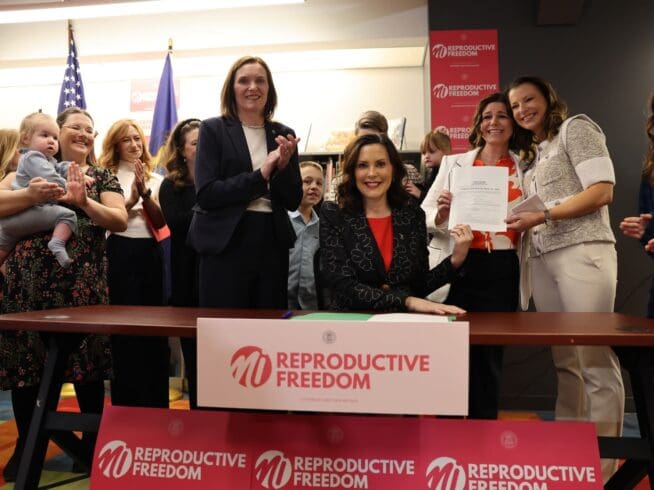Michigan police sweeps result in over 550 illegal firearms off the streets
Since 2022, law enforcement officials in Michigan have conducted 5,331 check-ins with felony offenders as part of a statewide initiative intended to reduce gun crime.

Police in Michigan have removed over 550 illegal guns from the possession of those serving probation and parole on felony convictions during sweeps conducted across the state, Gov. Gretchen Whitmer’s office recently announced.
As part of the Operation Safe Neighborhood program, the Michigan Department of Corrections parole and probation team partners with police agencies to conduct compliance checks of probationers and parolees who are prohibited from possessing a firearm under Michigan law. Since 2022, law enforcement officials have conducted 5,331 check-ins with probationers and parolees, during which officers have also recovered illegal drugs and ammunition, the governor’s office reported.
“As a former prosecutor, protecting public safety is a top priority,” Whitmer said in a statement. “By getting more than 550 illegal firearms out of the hands of criminals before they can be used in the commission of a crime, we are taking action to keep families and communities safe.”
Whitmer first began efforts to remove illegal guns from the street in 2021, when she launched the MI Safe Communities program.
There are roughly 32,000 probationers and 8,500 parolees in the state, of which 20% have been convicted of a gun crime. MDOC spokesperson Kyle Kaminski said the department looks at factors such as the results of risk and needs assessments, a probationer’s or parolee’s criminal history, and their progress under supervision when deciding which individuals may be most likely to possess a firearm illegally.
“The Michigan Department of Corrections has always stressed accountability for those on supervision, including regular contact with their supervising agent and a zero-tolerance approach to illegally possessing firearms,” Kaminski said. “Operation Safe Neighborhoods was an evolution of this approach, working with partner law enforcement agencies to focus compliance checks on individuals with the highest likelihood of illegally possessing weapons while under supervision.”
Kaminski said that after police collect the illegally possessed guns, the weapons can potentially be used as criminal evidence, or they are disposed of based on the specific agency’s firearm policies.
Nearly one in three reported violent crimes in Michigan involve a firearm, according to the governor’s office.
Ryan Bates, executive director of End Gun Violence Michigan, said there are several ways felony offenders on probation or parole could illegally obtain guns: the black market, another person who may purchase the weapon on their behalf, or theft from cars, homes or gun shops.
“When folks who have been convicted of a felony are breaking our gun laws, it makes our communities less safe,” Bates said. “Folks who have a felony conviction are more likely to go on and commit violent crime. So we need to make sure that they’re following the conditions of their release and are not engaging in behaviors that could endanger the community.”
Bates said Michigan used to lag behind other states when it came to gun violence prevention, but the Whitmer administration and decades of advocacy work have now made Michigan a leader on the issue.
Last year, Whitmer signed legislation passed by the Democratic-led Legislature that establishes universal background checks for all firearm purchases, creates safe storage requirements to prevent guns from getting into the hands of children, allows extreme risk protection orders that temporarily remove a firearm from someone’s possession who may be a danger of themselves or others and prohibits convicted domestic abusers from owning firearms.
In conversations he’s had with prison reform activists, Bates said, he has also learned the importance of adequately informing formerly incarcerated people, who often have to fill out an abundance of paperwork upon their release, about their firearm prohibitions.
“I would encourage folks who have a felony conviction, or are on probation or parole, to ensure that they’re in compliance,” Bates said. “And we need to do a better job educating folks who have these prohibitions about the laws that apply to them.”




